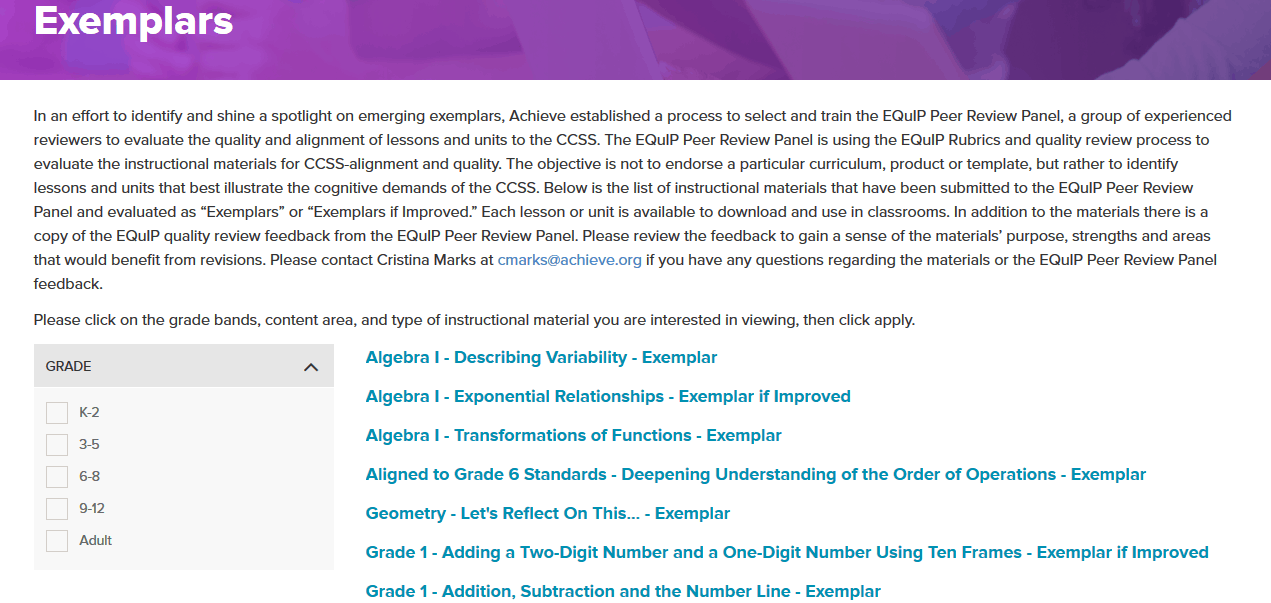This post was adapted from content available on Achieve’s website here: http://www.achieve.org/files/About%20EQuIP_041514_0.pdf
EQuIP (Educators Evaluating the Quality of Instructional Products) is an initiative of Achieve designed to identify high-quality materials aligned to the Common Core State Standards (CCSS). The objectives are two-fold:
- Build the capacity of educators to evaluate and improve the quality of instructional materials for use in their classrooms and schools
- Increase the supply of high-quality lessons and units aligned to the CSSS that are available to elementary, middle, and high school teachers as soon as possible
EQuIP builds on a collaborative effort of education leaders from Massachusetts, New York, and Rhode Island that Achieve facilitated. The outcome of that effort was the development of the “Tri-State Rubrics” and a quality review process designed to determine the quality and alignment of instructional lessons and units to the CCSS.
Building on the success of that effort, Achieve has since facilitated cross-state convenings with 26 states.
EQuIP Rubrics and Quality Review Process
The EQuIP quality review process is a collegial process that centers on the use of criteria-based rubrics for English language arts (ELA)/literacy and mathematics. The criteria are organized into four dimensions focusing on key initiatives of the CCSS: Alignment to the Depth of the CCSS, Key Shifts in the CCSS, Instructional Supports, and Assessment.
As educators examine instructional materials using the criteria in each dimension they are able to use common standards for quality and generate evidence-based commentary and ratings on the quality and alignment of materials to improve lesson and unit plans.
The EQuIP rubrics are designed to evaluate:
- Lessons that include instructional activities and assessments aligned to the CCSS that may extend over a few class periods or days
- Units that include integrated and focused lessons aligned to the CCSS that extend over a longer period of time
- The rubric is NOT designed to evaluate a single task or activity
- The rubrics do not require a specific template for lesson or unit design
EQuIP on the Ground
Because of the dynamic approach with which educators can engage the EQuIP rubrics, their functionality goes far beyond that of a simple evaluation tool. Many states and districts have embraced the rubrics and quality review process to support their implementation of the CCSS in a variety of ways including:
- Guiding the development of lessons and units
- Evaluating existing lessons and units to identify improvements needed to align with the CCSS
- Providing educators criterion-based quality feedback on their lessons and unit plans
- Helping educators and instructional leaders foster a culture of collaboration on developing and sharing lesson and unit plans
- Building the capacity of educators and education leaders to gain a deeper understanding of the CCSS
- Informing vendors of criteria that will be applied in the evaluation of proposals and final products
EQuIP Tools and Resources
EQuIP provides a variety of tools to support the implementation of CCSS aligned material including:
- The EQuIP Rubrics for Lessons & Units are made up of three distinct rubrics designed to align lessons and units to the CCSS: math (K-12), ELA/Literacy (3-12), and ELA/Literacy (K-2). The rubrics and the associated feedback forms encompass the process through which teams of educators can evaluate, develop, and improve lessons and units aligned to the CCSS.
- The EQuIP Student Work Protocol is designed to be used in coordination with the EQuIP rubrics to establish or articulate the relationship between student work and the quality and alignment of instructional materials that previously have been reviewed using the EQuIP quality review process.
- The EQuIP Peer Review Panel consists of a group of expert reviewers who have been trained to apply the EQuIP Rubrics and quality review process to lessons and units that have been submitted by states, districts, partners, and educators. Lessons and units that are identified by the EQuIP Peer Review Panel as Exemplars will be publicly posted on the Exemplar tab of the EQuIP webpage so that all states and districts can benefit from these materials.
- EQuIP eLearning Modules are web-based resources that aim to elevate the learner’s knowledge and understanding of the EQuIP quality review process, which is designed to increase the ability of educators–and educational leaders –to identify and create quality instructional materials aligned to the CCSS.
- EQuIP Training Materials are designed to support a group’s knowledge and understanding of the EQuIP quality review process. Specifically, participants will explore what effective observations and criterion-based feedback look like and experience the process of reviewing instructional materials using the EQuIP Quality Review criteria, rating scales, and rating descriptors. The materials provided for each session include facilitator’s notes, slide deck, and a single lesson or unit for review, as well as any additional materials needed to complete the review process.
- EQuIP Exemplars are selected by the EQuIP Peer Review Panel as representing excellence in unit or lesson creation that is aligned with the spirit and letter of the CCSS. The EQuIP Peer Review Panel is using the EQuIP Rubrics and quality review process to evaluate the instructional materials for CCSS alignment and quality.

The EQuIP exemplar page allows you to search by grade and subject for exemplar lessons that have passed an EQuIP Peer Review Panel review.
















